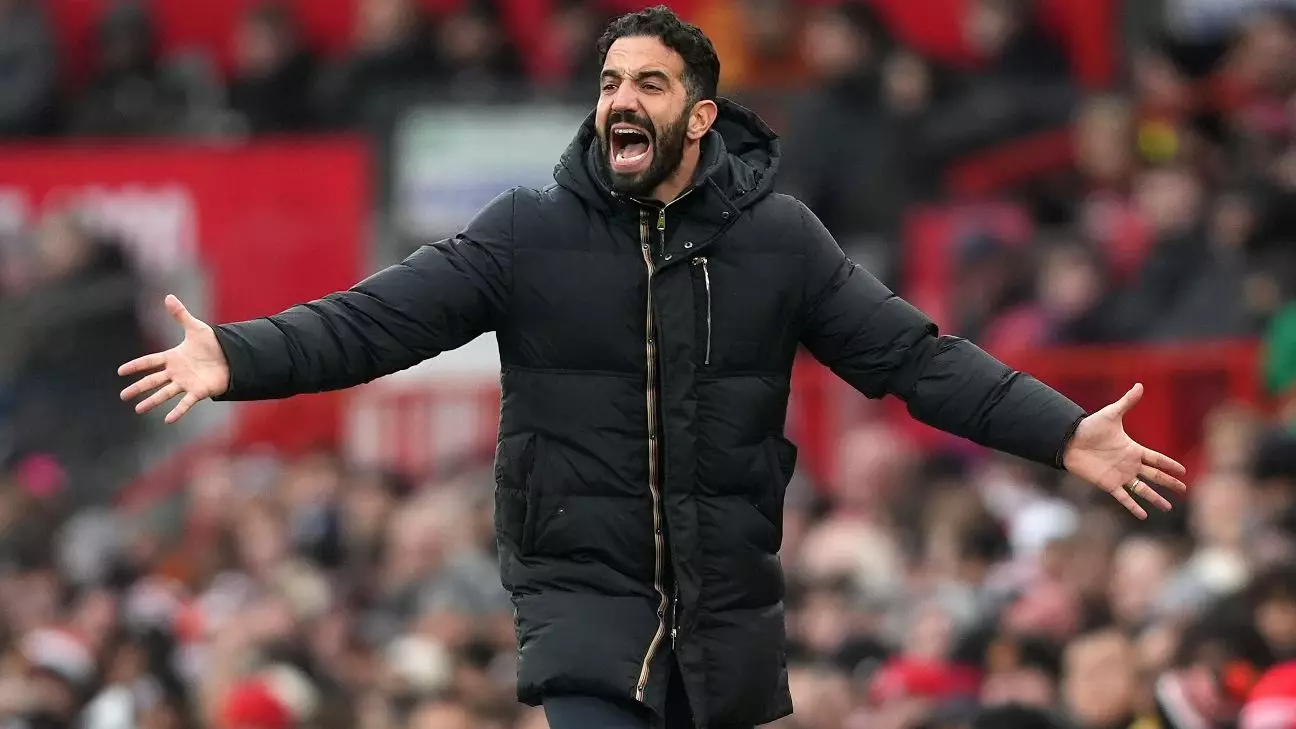In the world of football, leadership often comes with intense scrutiny, and Manchester United’s head coach, Ruben Amorim, is acutely aware of the ramifications surrounding his position. Having assumed control of one of the sport’s most storied clubs, Amorim’s tenure has begun with a tumultuous phase characterized by inconsistent performances and unanticipated challenges. With seven losses in 13 Premier League matches since his arrival, the pressure mounts as each game presents an opportunity for redemption or further critique. This precarious position signifies not just the highs and lows of a coaching career but also the intricate dynamics of a club marred by its storied past and high expectations.
Amorim’s candid admission that he is “fighting for his job” resonates deeply in an environment where inresults can swiftly alter a coach’s destiny. As he prepares to face Leicester City in an FA Cup fixture, the Portuguese tactician understands that his future may hinge on the outcomes of these critical encounters. The seemingly endless ambition of Manchester United fans to return to the upper echelons of English football amplifies the urgency of his circumstances.
The January transfer window often serves as a pivotal juncture for teams, providing an opportunity to recalibrate and reinforce squads. Amorim’s acknowledgment of the “risk” undertaken in the club’s transfer strategy reveals a deliberate approach that diverges from common expectations. With the arrival of defenders Patrick Dorgu and Ayden Heaven, the club’s commitment appears focused on defensive bolstering rather than addressing a glaring need in the attacking front. The absence of key players like Antony and Marcus Rashford underscores a significant gap in offensive capabilities, exacerbating the challenges Amorim must navigate.
By choosing a cautious route in the transfer window, Amorim seems committed to fostering a squad equipped with a higher-caliber player profile, though the sacrifices involved in this strategy may leave the team vulnerable in the immediate term. The stakes are particularly magnified for a manager navigating the choppy waters of a conflated timeline — rekindling a team’s form while simultaneously cultivating new talent usually requires time, a factor in short supply in the judgment-laden world of elite football.
Amidst swirling uncertainty, one of Amorim’s key messages underscores the importance of adaptability and patience. He identifies the core principles that guide his vision: “Since day one… I have a clear idea of what I want to do.” His inclination towards tactical refinement and team cohesion reflects an understanding that lasting change requires an investment beyond immediate returns. For supporters, this sentiment may act as a comfort in uncertain times, though tangible manifestations in the form of victories and improved performances are essential to foster ongoing faith in his model.
Amorim’s approach to training is also noteworthy; he expresses that the newfound time for preparation should yield dividends in performance quality. It is here that realism must balance with optimism — while having more time to train presents opportunities for growth, translating that to on-pitch success is a different matter entirely. In the scrutiny of fans and journalists, the narrative surrounding his success will be measured by results, leaving little room for theoretical aspirations to take root without proof of efficacy.
The departure of Rashford, who has joined Aston Villa on loan, poignantly highlights the turbulent environment within which Amorim operates. While his joking remarks about offloading inquiries regarding Rashford to Unai Emery provide a temporary reprieve, they fail to mask the underlying challenges the club currently faces in leadership and squad dynamics. The loss of significant talents not only strains the attacking options available but underscores a transitional period that begs for clarity and decisive action from both Amorim and the club at large.
As Ruben Amorim grapples with the multifaceted challenges of managing Manchester United, he stands at a crossroads filled with both peril and potential. His willingness to take calculated risks in both staffing and strategy indicates a long-term vision, yet results remain paramount in a results-driven industry. The unfolding narrative will demand not just tactical acuity from Amorim but also an ability to cultivate resilience and adaptability within a squad that is yearning for stability amidst change.

